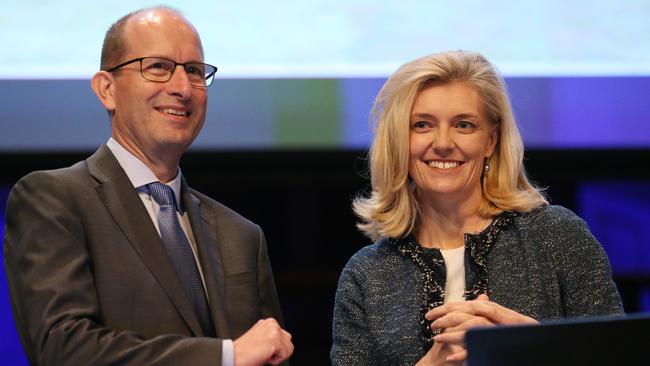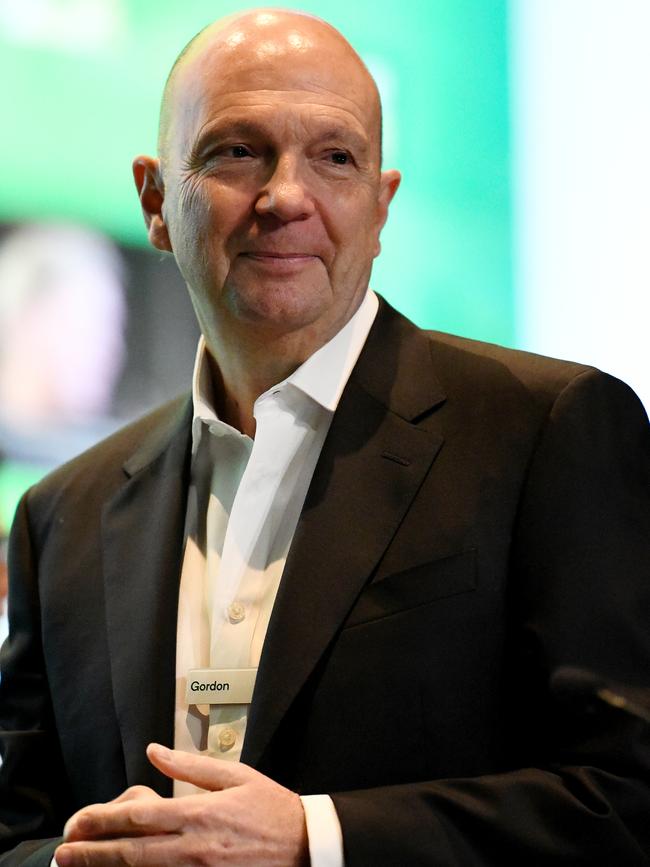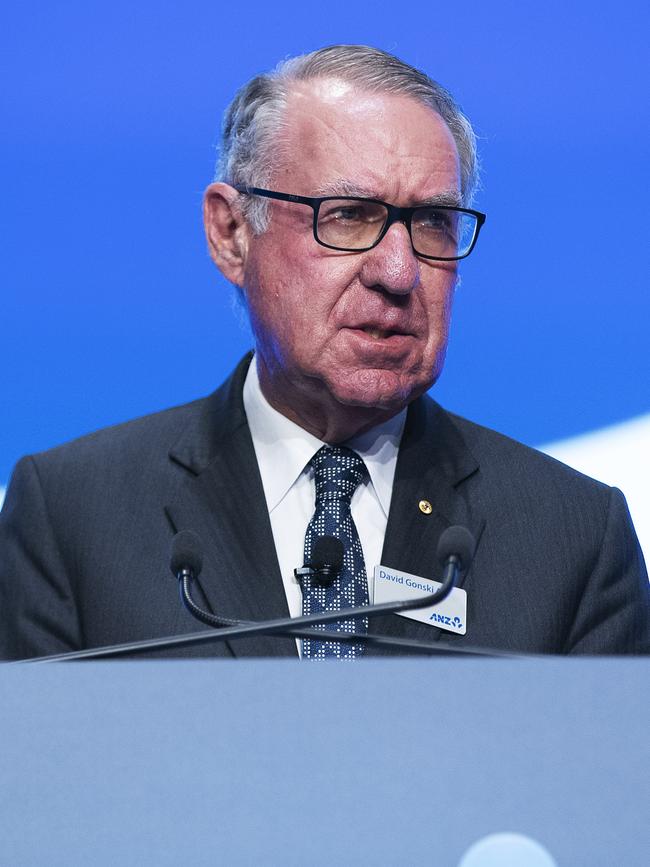ASIC drops investigation against former AMP chairman Catherine Brenner
ASIC’s move to clear ex-AMP chair Catherine Brenner of any wrongdoing over the fees-for-no-services scandal has reopened divisions from 2018.

ASIC’s move to clear former AMP chair Catherine Brenner of any wrongdoing over the company’s fees-for-no-services scandal has reopened divisions from 2018, with Woolworths and Origin chair Gordon Cairns saying Ms Brenner effectively had to “prove her innocence” to continue her career.
Mr Cairns joined other corporate chiefs, including ANZ chair David Gonksi and QBE chair and former AMP executive chair Michael Wilkins, in describing Ms Brenner as a person of “high integrity” who should be able to return to board life if that was her ambition.
“She has been remarkably resilient; lesser individuals would have crumbled under the scrutiny she’s had,” Mr Cairns said.
“The process is very difficult and I’d hate to go through it myself — effectively you’re judged to be guilty until proven innocent, which means your whole career is put on hold.
“So I think she was treated unfairly and now this is behind her, she should be able to continue her career as a non-executive director.”
Woolworths currently had no board vacancies and Mr Cairns, who knows Ms Brenner socially but not in a boardroom setting, said he would step down as Origin chair later this year.
In different circumstances, however, Ms Brenner would be a “very strong” candidate.
After The Australian broke the news online that she had received a “no action letter” from ASIC on Monday, Ms Brenner said she was always confident that she had done nothing wrong.
“But it’s particularly pleasing to have had that confirmed today,” she said.
“I look forward to building on the many experiences — challenging, difficult and rewarding — that I’ve had in 25 years of business.”
As to lessons learnt, she said it was important to remain “calm and considered when times are tough and lots of forces are working against you”.
Bad experiences, she said, also built resilience, which was a valuable quality to draw on when needed.
Ms Brenner resigned in April 2018, three days after senior counsel assisting Rowena Orr told royal commissioner Ken Hayne that the evidence showed AMP had no respect for compliance, and showed a willingness by executives and directors to deal with ASIC in a manner that could be seen as a deliberate attempt to mislead.
Ms Orr invited Mr Hayne to find that AMP had broken the law on multiple occasions by charging fees without providing the required services, and presenting ASIC with an expert’s report prepared by the law firm Clayton Utz that was said to be independent but was found to have had a lot of internal input.

One of the debates that was ignited in the AMP imbroglio was whether female directors and chairs attracted more savage criticism and were held to higher standards than their male counterparts.
This was particularly so after the clean-out of AMP’s female directors.
Ms Brenner agreed that many observers had turned AMP into a gender issue, drawing a spurious connection between the company’s problems and the fact that it had a female chairman and non-executive directors.
“Clearly companies benefit from diversity, so I hope my experiences don’t deter other women,” she said.
News she will face no action comes amid continuing turmoil at AMP, with last week’s sudden exit of AMP’s Australia chief AlexWade related to allegations of poor conduct, including lewd photos, presented to the company.
While Ms Brenner is now in the clear, AMP and other executives are not so fortunate.
ASIC deputy chairman and head of enforcement Daniel Crennan told a parliamentary committee last week that the group could face criminal action before the end of the year.
Mr Crennan said a number of investigations were ongoing in relation to AMP, and a number of matters had been referred to the Commonwealth Director of Public Prosecutions.
Asked by Labor MP Andrew Leigh if any matters were likely to be filed before the end of the year, he said: “Yes, I would think so.”
The AMP scandal erupted in early 2018, when the financial services royal commission heard sensational allegations that the company had charged fees without providing investment advice and subsequently misled ASIC about the independence of an expert’s report by law firm Clayton Utz.
The claims triggered the resignation of Ms Brenner in April, three days after senior counsel assisting Rowena Orr told Ken Hayne that AMP had no respect for compliance, and showed a willingness by executives and directors to deal with ASIC in a manner that could be seen as a deliberate attempt to mislead.
Ms Orr invited Mr Hayne to find that AMP had broken the law on multiple occasions by charging fees for no service, and presenting the Clayton Utz report as independent when it had a lot of internal input.
Ms Brenner, who also resigned from the boards of Boral and Coca-Cola Amatil when the firestorm spread, was implicated because she sent an email to AMP’s then-chief legal counsel Brian Salter and lead Clayton Utz partner Nick Mavrakis about the omission of Mr Meller from the report.
She asked that “Clayton Utz’s findings (whatever they may be) regarding Mr Meller be included”.
The Australian reported last October that Ms Brenner’s explanation to ASIC was that she was only correcting an omission in the report rather than engaging in a cover-up.
AMP asserted at the time that Ms Brenner, Mr Meller and other directors had not acted inappropriately in relation to the preparation of the Clayton Utz report.
Mr Gonski, who mentored Ms Brenner, said he was pleased ASIC had informed her it would not take any action.
“I’d turn this into a positive – it’s very decent of ASIC to do,” the ANZ chairman said.
“They don’t have to do that so it’s a significant thing and a good policy so that people can get on with their lives.

“From my experience, I’ve always found Catherine to be of high integrity and high aptitude, so I hope this will enable her to go from strength to strength.”
Mr Wilkins, who joined the AMP board in 2016 and served as executive chairman for a crisis period in 2018, said Ms Brenner was a “good and conscientious” director before she resigned to take accountability for the group’s missteps.
“Like a lot of people who get caught in the noise and sensationalism, I believe she tried to do the right thing and did the right thing,” he said.
“Catherine felt it was in the best interests of the organisation to step down and the board agreed.
“If she wants to return to corporate life I’d see no reason why not.”







To join the conversation, please log in. Don't have an account? Register
Join the conversation, you are commenting as Logout